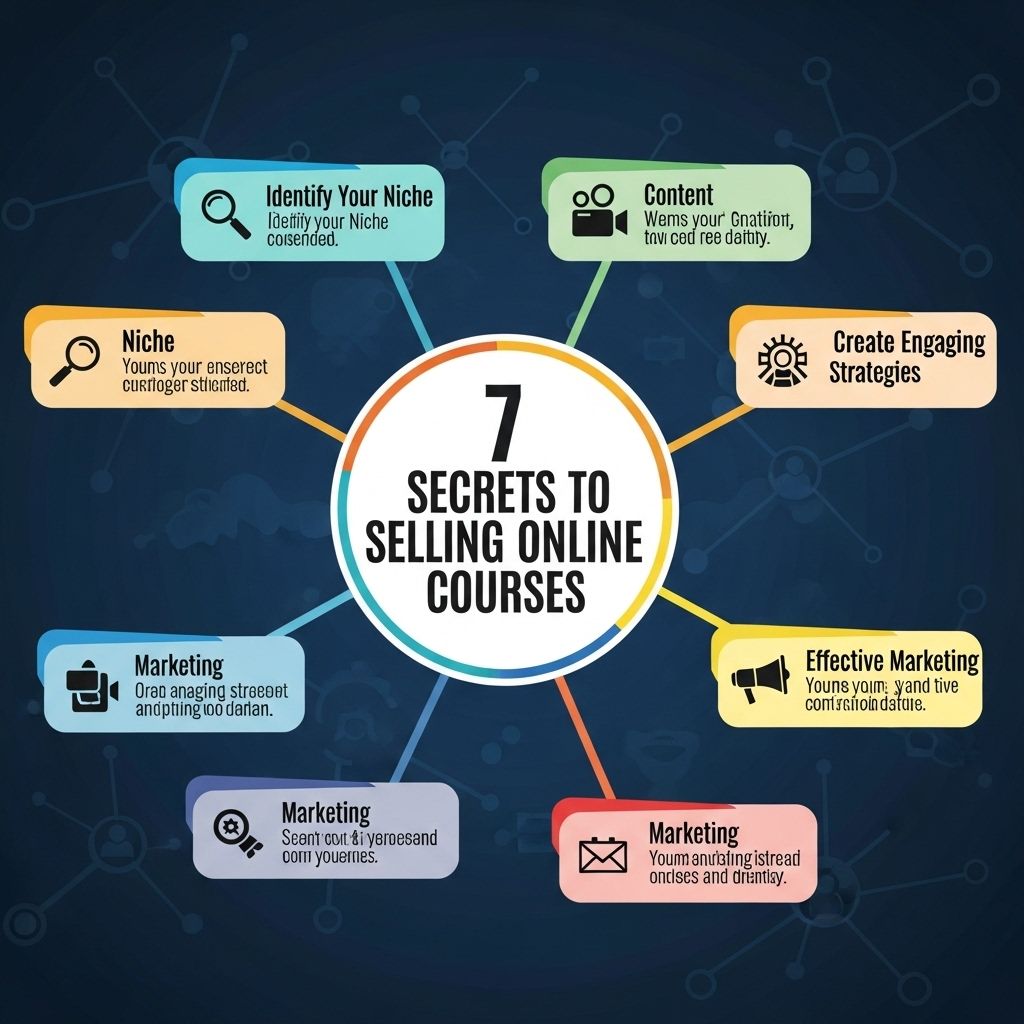In the ever-evolving landscape of digital education, selling online courses can be both a lucrative and fulfilling venture. However, with the proliferation of platforms and content available, it is crucial to stand out from the competition. Whether you are an industry expert, a passionate educator, or an entrepreneur looking to share your knowledge, mastering the art of selling online courses can significantly impact your success. Below, we explore several key strategies that can elevate your course offerings to new heights.
Selling online courses can be a lucrative venture, but it requires a strategic approach to stand out in a crowded market. Here are seven essential secrets to successfully launch and promote your courses, enhancing your chances of attracting and retaining students. For those looking to present their course materials attractively, consider exploring bag mockup visualization tips to showcase your content.
Table of Contents
Understanding Your Audience
Before you create and market your online course, it’s vital to have a profound understanding of your target audience. Knowing who your learners are will help you tailor your content to meet their needs effectively.
Identifying Your Ideal Learner
- Demographics: Age, gender, location, and education level can influence learning preferences.
- Interests: What topics excite them? Understanding their interests aids in course creation.
- Goals: What are your audience’s aspirations? Are they seeking a career change, skill enhancement, or personal development?
By creating a learner persona, you can better align your course with their expectations, ensuring improved engagement and satisfaction.
Cultivating Compelling Content
The heart of any successful online course lies in its content. High-quality, relevant content will not only attract learners but also encourage them to complete the course and recommend it to others.
Structuring Your Course
- Define Learning Outcomes: What skills or knowledge should students gain by the end of the course?
- Break Down Content: Organize your material into manageable modules and lessons.
- Engage with Multimedia: Use videos, quizzes, infographics, and interactive content to enhance the learning experience.
Effective content naturally leads to higher user satisfaction and better word-of-mouth marketing.
Choosing the Right Platform
The platform you choose to host and sell your online course can significantly influence your reach and sales figures. There are numerous options available, each with its advantages and drawbacks.
Comparing Popular Platforms
| Platform | Pros | Cons |
|---|---|---|
| Udemy | Large audience, easy to use, built-in marketing | High competition, platform fees |
| Teachable | Customizable, strong analytics, good support | Monthly fees, transaction fees |
| Thinkific | Free plan available, no transaction fees | Less built-in audience, limited free features |
Evaluate your goals, budget, and desired level of control over your course content and user experience when selecting a platform.
Marketing Your Course Effectively
Marketing is essential for reaching potential learners. Crafting a compelling marketing strategy will help elevate your course visibility and attract students.
Utilizing Social Media
Social media platforms are powerful tools for promoting your online courses. Consider these strategies:
- Content Sharing: Share insights, tips, and snippets of your course content to generate interest.
- Live Sessions: Host webinars or live Q&As to engage directly with potential students.
- Community Building: Create groups or forums for discussion to foster a sense of belonging.
Building an Email List
Email marketing remains one of the most effective ways to promote your course. Consider these steps:
- Lead Magnets: Offer free resources or introductory courses in exchange for email sign-ups.
- Segmentation: Tailor your email communication based on user interests and behaviors.
- Consistent Communication: Regularly send newsletters, updates, and promotional offers to keep potential learners engaged.
Price Your Course Strategically
Pricing is a crucial factor that can significantly affect your sales. An effective pricing strategy should consider various aspects.
Factors to Consider When Pricing
- Value Proposition: What unique value does your course provide compared to others in the market?
- Market Research: Analyze competitors’ pricing to find a competitive yet fair price point.
- Discounts and Promotions: Consider introductory offers or seasonal discounts to entice initial sign-ups.
Gathering Feedback for Continuous Improvement
Once your course is launched, gathering feedback is vital for ongoing enhancement. Student testimonials and reviews can provide insight into the effectiveness of your content.
Methods for Collecting Feedback
- Surveys: Post-course surveys can help you gather quantitative data on student satisfaction.
- Direct Communication: Encourage students to share their thoughts through forums or direct messages.
- Active Engagement: Maintain discussions in your course community to understand areas for improvement.
Adapting your course based on feedback not only enhances learning but also builds a positive reputation.
Creating a Community Around Your Course
Building a community fosters engagement and retention. Students are more likely to complete a course when they feel part of a supportive network.
Leveraging Discussion Forums
Create dedicated spaces for students to interact, ask questions, and share resources. Here are some benefits:
- Peer Support: Students can help each other solve problems and share insights.
- Networking Opportunities: Building connections can lead to collaborations and partnerships.
- Increased Engagement: A vibrant community encourages participation and accountability.
By implementing these strategies, you can create a thriving online course that not only attracts students but also enhances their learning journey and satisfaction. Ultimately, the secrets to successfully selling online courses lie in understanding your audience, delivering quality content, effective marketing, and fostering a community that supports learning and growth. Start incorporating these elements today, and watch your online course flourish.
FAQ
What are the most effective strategies for selling online courses?
The most effective strategies include identifying your target audience, creating high-quality content, leveraging social media marketing, utilizing email marketing, offering free previews or samples, and optimizing your sales funnel.
How can I determine the right price for my online course?
To determine the right price, consider factors such as the value of the content, competitor pricing, your target audience’s willingness to pay, and any additional resources or support you provide.
What platforms are best for hosting and selling online courses?
Popular platforms for hosting and selling online courses include Teachable, Thinkific, Udemy, Kajabi, and Skillshare. Each has its own features and pricing structures, so choose one that fits your needs.
How important is marketing in selling online courses?
Marketing is crucial for selling online courses as it helps you reach your target audience, build brand awareness, and convert interested learners into paying customers.
What role does customer feedback play in the success of an online course?
Customer feedback is vital as it helps you understand your audience’s needs, improve your course content, enhance the learner experience, and increase overall satisfaction, leading to better reviews and referrals.
Are free trials effective for selling online courses?
Yes, free trials can be very effective as they allow potential students to experience your course content firsthand, which can build trust and increase conversion rates.









